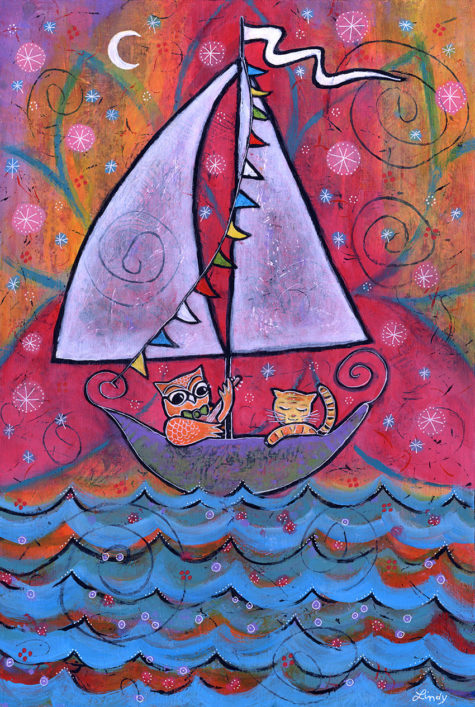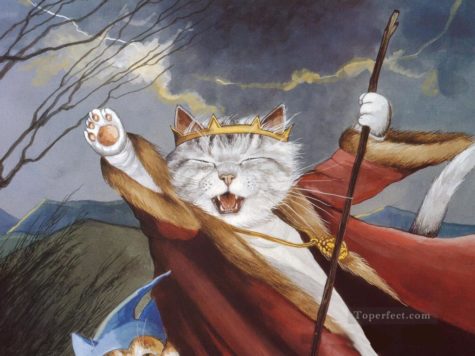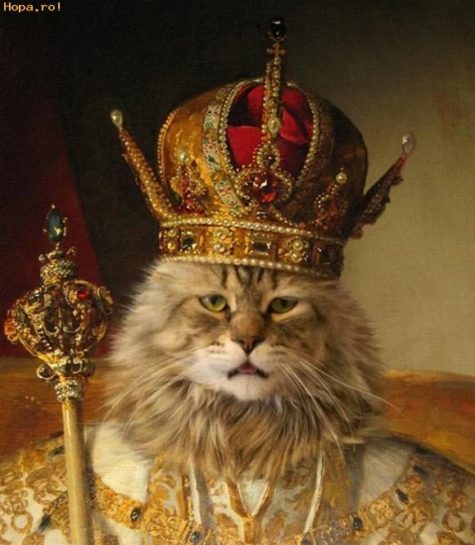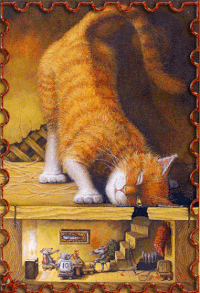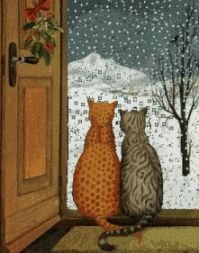King
The Bronze Ring
Once upon a time there lived a king whose palace was surrounded by a spacious garden. In spite of good soil and many gardeners, the garden never grew trees or plants, fruit or flowers. The king was in despair. One day, a wise old man told the king “”Your gardeners do not understand their business; they don’t know how to cultivate gardens because their fathers were carpenters and cobblers. You need a gardener whose father and grandfather were gardeners before him. Then your garden will be full fruit and flowers.”
The King sent messengers to every town and village in the land to look for a gardener father and grandfather had been gardeners before him. For forty days they searched until the found such a gardener. The man protested that he was poor and owed money, but the king gave him new clothes and paid his debts and insisted he become the royal gardener. The man had no difficulty in making the royal garden produce fruit and flowers and after a year the king showered gifts on him.
The gardener had a handsome and well-mannered son whose job it was to take the best fruit to the king and the choicest flowers to the king’s sixteen year old daughter, the princess. The king considered it time his princess should marry and he had chosen the prime minister’s son to be her husband.
“I will never marry the prime minister’s son,” protested the princess, “I love the gardener’s son.”
The king became very angry and then very sad. He declared that such a husband was not worthy of his daughter, but the Princess was determined to marry the gardener’s son. So the king consulted his ministers.
“This is what you must do,” they told him, “To get rid of the gardener you must send both suitors to a very distant country. The one who returns first shall marry your daughter.”
The King followed this advice. He gave the minister’s son a splendid horse and a purse full of gold. He gave the gardener’s son an old lame horse and a purse full of copper coins. Everyone thought the gardener’s son would never come back from his journey.
The day before they started the Princess met her lover and said, “Take this purse full of jewels and make the best use you can of them for love of me. Come back quickly and demand my hand.”
The two suitors left the town together, but the minister’s son went off at a gallop on his good horse was soon far out of sight. After some days he reached a fountain beside which sat a ragged old woman.
“Good morning young traveler,” said the old woman, but the minister’s son didn’t reply. “Pity me, young man,” she said, “I am dying of hunger; I’ve been here three days and no one has given me anything.”
“Go away, old witch,” replied the minister’s son, “I can do nothing for you.” With that he went on his way.
Much later that day the gardener’s reached the fountain upon his old lame horse.
“Good-day, young traveler,” said the beggar-woman, “Have pity on me for I’ve eaten nothing these past three days.”
“Good-day, good woman,” replied the gardener’s son, “Take my purse and mount behind me, for your legs can’t be very strong.”
The old woman mounted behind him and in this style they reached the chief city of a powerful kingdom. The minister’s son was lodged in a grand inn while the gardener’s son and the old woman dismounted at the inn for beggars. The next day the gardener’s son heard a great noise in the street, and the King’s heralds passed, and crying: “The King is old and infirm. He will give a great reward to whoever will cure him and give him back the strength of his youth.”
The old beggar-woman said to the gardener’s son, “Go out of the town by the south gate, and there you will find three little dogs of different colors: one white, one black and one red. You must kill them and then burn them separately, and gather up the ashes. Put the ashes of each dog into a bag of its own color, then go before the door of the palace and cry out ‘A celebrated physician has come to cure the king and give him back the strength of his youth.’ The king’s physicians will call you an impostor before you can see the king himself. You must then demand as much wood as three mules can carry, and a great cauldron, and must shut yourself up in a room with the king. When the cauldron boils you must throw him into it and let him cook until his flesh is completely separated from his bones. Then arrange the bones in their proper places and throw the ashes out of the three bags over the bones. The King will come back to life as a young man. For your reward you must demand the bronze ring which has the power to grant you everything you desire.”
The gardener’s son followed the old woman’s directions. First he killed and burnt the three dogs and gathered up their ashes. Then he presented himself to the palace as a physician. When he won admittance to see the king he carried out the old woman’s instructions and from the boiled bones the king rose up as a young, vigorous man. The king offered him many treasures, but the gardener’s son insisted on the magical bronze ring.
After bidding farewell to the old woman, the gardener’s son instructed the bronze ring to prepare a splendid ship of silver and gold in which to continue his journey, a cargo of precious jewels and a crew of fine handsome sailors. In this ship he sailed to a great town and established himself in a fine palace. After a few days he met his rival, the minister’s son. The minister’s son had run out of money and was reduced to cleaning the streets of manure. He did not recognize the gardener’s son and the gardener’s son feigned ignorance also.
The gardener’s son told him, “You are a stranger, but I will help you. I will give you a ship to carry you home, but you must accept it willingly whatever its condition.”
The minister’s son agreed and presently they both reached the palace where the palace servants had him strip. The gardener’s son ordered the ring to become red hot and he branded his rival’s back with it. He then ordered the ring to prepare a ship of black and rotten timbers with ragged sails and an ugly, sickly crew and a cargo of filth. In this dreadful vessel the minister’s son arrived home first and, in spite of his condition, the king began to prepare for the wedding. The princess was in despair.
The next daybreak, a wonderful ship of silver and gold sailed into the harbor. The sailors were handsome and the captain appeared to be a prince. The king immediately welcomed the ship’s captain to the palace as his guest for however long the man remained in the capital.
“My daughter is about to be married,” said the king, “will you give her away?”
“I shall be charmed, sire,” replied the young captain, but when he saw the minister’s son he exclaimed “how can you marry your daughter to a man such as that?”
“He is my prime minister’s son!”
“What does that matter? I cannot give your daughter away. The man she is betrothed to is one of my servants.” The king doubted this, but the young captain went on, “I met him in a distant town reduced to sweeping muck from the streets and I engaged him as one of my servants out of charity.”
“This is impossible!” cried the king.
“Do you wish me to prove what I say?” asked the young captain, “This young man returned in a vessel which I fitted out for him, a filthy and unseaworthy ship crewed by crippled sailors.”
“It is quite true,” said the king.
“It is false,” cried the minister’s son. “I do not know this man!”
“Sire,” said the young captain, “You will find my brand on his back.”
The minister’s son admitted the truth of the matter and went away in disgrace. The young captain revealed himself as the gardener’s son and that very day he married the princess.
The young couple were happy and the king was pleased with his new son-in-law, but presently the captain of the golden ship found it necessary to take a long voyage. In the outskirts of the capital there lived an old magician who had studied the dark arts. He knew that the gardener’s son had only succeeded because of the genie who obeyed the bronze ring and he wanted the ring for himself.
The magician went down to the sea-shore and caught some pretty little red fishes. Pretending to be a peddler, he knocked on the princess’s door and ask if she wished to buy the pretty fish.
“What will you take for your fish?” she asked him.
“A bronze ring,” replied the peddler.
The princess didn’t know the value of her husband’s bronze ring, which he had left safely under his pillow, so she gave it to the peddler in exchange for the fishes. Hardly had the magician reached home than he commanded the ring to turn the golden ship to black wood and turn the handsome crew to hideous swarthy men and make the precious cargo into black cats. The ring obeyed him instantly and the young captain knew immediately that his ring had been stolen.
In this ship he sailed miserably from shore to shore, but wherever he went people laughed at him and his ship. Soon his poverty was so great that he and his crew and the poor black cats had nothing to eat but herbs and roots. After sailing for a long time he reached an island inhabited by mice. The captain landed upon the shore and the hungry black cats set upon the mice at once.
The queen of the mice held a council, “These cats will eat every one of us if the captain of the ship does not shut the ferocious animals up. Let us send a deputation of our bravest mice at arms.”
When the mice at arms found the young captain, they said, “Go away quickly from our island or we shall perish, every mouse of us.”
“Upon one condition,” replied the young captain, “You must first bring me back a bronze ring which some clever magician has stolen from me. If you do not do this I will land all my cats upon your island, and you shall be exterminated.”
The mice were dismayed. “What is to be done?” said the Queen. “How can we find this bronze ring?” She held a new council, calling in mice from every quarter of the globe, but nobody knew where the bronze ring was. Suddenly three mice arrived from a very distant country. One was blind, the second lame, and the third had no ears.
“We come from a far distant country,” said the newcomers, “An old sorcerer has the bronze ring and keeps it in his pocket by day and in his mouth by night.”
“Go and take it from him, and come back as soon as possible,” ordered the queen, “Else the cargo of black cats will eat us all.”
The three mice set sail for the magician’s country. When they reached the capital they ran to the palace, leaving the blind mouse on the shore to take care of the boat. That night they found the wicked old man asleep with the bronze ring into his mouth. The mouse with no ears dipped her tail in a pepper-pot and held it to the sorcerer’s nose. The sorcerer sneezed and the ring shot out of his mouth, but he did not wake. The lame mouse snatched up the ring and the three mice set sail back to their own land.
Naturally they began to talk about the bronze ring.
“Which of us deserves the most credit?” they asked each other.
“I do,” said the blind mouse, “for without my watchfulness our boat would have drifted away to the open sea.”
“I do,” cried the mouse with no ears, “did I not cause the ring to jump out of the man’s mouth?”
“I do,” cried the lame mouse, “for I ran off with the ring.”
The three mice began to quarrel and in the argument the bronze ring fell into the sea.
“How are we to face our queen,” said the three mice “when we have lost the ring and condemned our people to be utterly exterminated by black cats?”
So they landed on the first island they came to. The lame mouse and the mouse with no ears went to find nuts and roots, leaving their blind sister on the beach and she wandered sadly, eating whatever fish were washed up by the tide. Suddenly she let out a cry as her teeth bit something hard. It was the bronze ring, which had been swallowed by a fish. Joyfully, the three mice set sail for their own island and arrived just in time for the young captain was about to land his full cargo of hungry black cats to eat all the mice. With his ring returned, he turned his ship back to silver and gold, his crew back to handsome sailors and the hungry black cats became precious jewels once more.
The captain immediately sailed for home and took his revenge on the magician who had tricked the princess into giving over the ring. He seized the magician and tied him to the tail of a wild ass. The ass was set loose outside the city and dragged the magician behind him, breaking him utterly on the hard ground.
Found at: Moggy Cat
The King of Cats ~ A British Tale
This is an old British tale about the King of Cats. It’s somewhat different from the Irish story of the King of Cats, which can be found here.
Once upon a time, a man had a calf to sell and decided to go to the November fair in Macroom. He borrowed a horse and cart from a neighbour and was to set off for the fair at about one o’clock in the morning to be sure of arriving nice an early and getting a good price. At one o’clock, he got up and looked outside. The night was too black to see anything, so he stirred the fire into life and put on a kettle for a cup of tea while he harnessed the horse.
There was a heavy mist coming down and the man was wet through by the time he had harnessed the horse and was ready for a hot cup of tea. He thought it was a foolish thing to be doing – going out on a cold, wet night to travel twenty miles in the dark, with only the lanterns on the sides of his cart to show him the way. Still, it had to be done, so he put on a thick coat and set off. The horse was just as unwilling to travel on that cold, wet night and would far rather be sleeping in its stable. Barely and hour had passed and both man and horse were wet through and miserable.
As they drew nearer to the town, the man could see the lights in the farms by the roadside, where the people were getting up for the fair – people who lived close enough to Macroom that they did not have to travel in the middle of the night. Soon there was quite a procession of people on the road with calves and cattle being driven to the fair. It was still dark and the daylight was only just coming.
The man took his place in the fair, and no one made him an offer for the calf for a long time. A few made offers of poor prices and other farmers told him that the prices were low anyway. In the end, cold and dejected and tired from lack of sleep, he accepted an offer, though the price was not a good one, rather than be left to take the calf home again which would have meant a wasted journey.
Cold, wet and hungry, he made a few purchases and then met with some friends for some bread, cheese and ale before they all set off for their homes. He was not looking forward to the long journey home, but at least a full stomach and a quaff of ale raised his spirits a little.
He let the horse go at her own pace and though the rain came down again, the man fell asleep wrapped in his greatcoat and huddled on the driver’s seat of the cart. Dozing fitfully, he barely heard the other travelers passing him, but he began to have strange dreams that could scarcely be told from reality.
As he was passing the graveyard of Inchigeela, a cat put his head through the railings and said to the man, “Tell Balgeary that Balgury is dead.” The man paid little heed to that, for he was too tired to know if it was real or just the product of his exhaustion. At last he arrived home and settled the horse in the stable with hay and water and went into the house to change out of his wet clothes.
His wife immediately began to ask about the fair – how many were there, whether he got a good price for the calf and whether he had heard any news while in town. After replying to questions, the farmer told her to be quiet a while and fetch him some tea to warm him through.
His wife fetched the tea and asked again if there was any news from town – people that had died, babies that had been born, people that had moved into or out of the area and people that had married since last time the farmer had been to town. Her husband told her he had been too wet and tired to stand around gossiping at the fair.
“Fancy going in all that way and hearing nothing at all,” complained his wife, “And not getting a good price for the calf either. You might as well have stayed at home for all the good that you get out of a fair.”
Finally, the man remembered the strange thing at Inchigeela and said “The only news, if you can call it that and not a dream, was when I was passing the graveyard of Inchigeela. A cat stuck his head out of the railings and said ‘tell Balgeary that Balguny is dead’.”
At that, their cat, sitting before the fine, jumped up and glared at the man. “The Devil fire you!” said the cat, “why didn’t you tell me before? I’ll be late for the funeral. It does no good for the heir to be late.”
And with that, the cat leapt through the cracked open window and was gone like the wind. From that day on, the farmer and his wife saw no sign of him.
The King of the Cats
Here’s a great cat story from Ancient Legends, Mystic Charms, and Superstitions of Ireland, by Lady Francesca Speranza Wilde, published in 1887.
A most important personage in feline history is the King of the Cats. He may be in your house a common looking fellow enough, with no distinguishing mark of exalted rank about him, so that it is very difficult to verify his genuine claims to royalty. Therefore the best way is to cut off a tiny little bit of his ear. If he is really the royal personage, he will immediately speak out and declare who he is; and perhaps, at the same the, tell you some very disagreeable truths about yourself, not at all pleasant to have discussed by the house cat.
A man once, in a fit of passion, cut off the head of the domestic pussy, and threw it on the fire. On which the head exclaimed, in a fierce voice, “Go tell your wife that you have cut off the head of the King of the Cats; but wait! I shall come back and be avenged for this insult,” and the eyes of the cat glared at him horribly from the fire.
And so it happened; for that day year, while the master of the house was playing with a pet kitten, it suddenly flew at his throat and bit him so severely that he died soon after.
A story is current also, that one night an old woman was sitting up very late spinning, when a knocking came to the door. “Who is there?” she asked. No answer; but still the knocking went on. “‘Who is there?” she asked a second the. No answer; and the knocking continued. “Who is there?” she asked the third time, in a very angry passion.
Then there came a small voice–“Ah, Judy, agrah, let me in,–for I am cold and hungry; open the door, Judy, agrah, and let me sit by the fire, for the night is cold out here. Judy, agrah, let me in, let me in!”
The heart of Judy was touched, for she thought it was some small child that had lost its way, and she rose up from her spinning, and went and opened the door–when in walked a large black cat with a white breast, and two white kittens after her.
They all made over to the fire and began to warm and dry themselves, purring all the time very loudly; but Judy said never a word, only went on spinning.
Then the black cat spoke at last–“Judy, agrah, don’t stay up so late again, for the fairies wanted to hold a council here tonight, and to have some supper, but you have prevented them; so they were very angry and determined to kill you, and only for myself and my two daughters here you would be dead by this time. So take my advice, don’t interfere with the fairy hours again, for the night is theirs, and they hate to look on the face of a mortal when they are out for pleasure or business. So I ran on to tell you, and now give me a drink of milk, for I must be off.”
And after the milk was finished the cat stood up, and called her daughters to come away.
“Good-night, Judy, agrah,” she said. “You have been very civil to me, and I’ll not forget it to you. Good-night, good night.”
With that the black cat and the two kittens whisked up the chimney; but Judy looking down saw something glittering on the hearth, and taking it up she found it was a piece of silver, more than she ever could make in a month by her spinning, and she was glad in her heart, and never again sat up so late to interfere with the fairy hours, but the black cat and her daughters came no more again to the house.
Borrowed from: Widdershins
